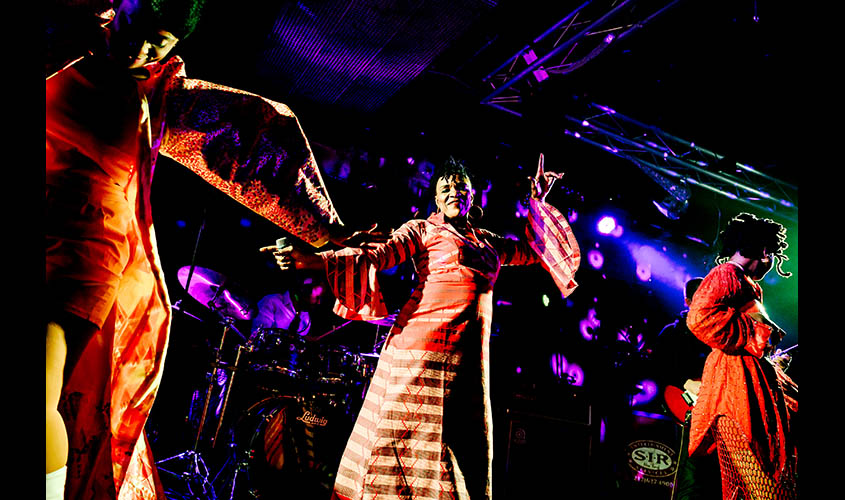A shrinking world, a growing potential audience, an ever-shifting definition of authenticity and the insatiable curiosity of musicians: Globalfest, the annual New York showcase for world music, flaunts all those frictions.
This year’s Globalfest, the 17th, was the most manic and clamorous of them all, a lineup of musicians demanding attention with speed, rhythm, passion, humor, costumes, dance moves and the determination to hold on to particular cultural heritages in a connected world. With 12 acts in five hours on the three stages of the Copacabana in Manhattan, this year’s event brought musicians from Korea, Brazil, Turkey, Hungary, Algeria, Senegal and the Louisiana bayou, and elsewhere. Some were expatriates, mingling sounds from their birthplaces with influences from their newer homes; others sought to thrust a local heritage into a 21st-century context. Few shied away from making a ruckus.
The lineup included well-known performers: Yungchen Lhamo, a Tibetan singer whose meditative songs and Buddhist sentiments were Globalfest’s brief moment of serenity on a boisterous night. Nathan and the Zydeco Cha-Chas, who hooted and clattered through bayou rockers and two-steps. And Cheikh Lo from Senegal, who crooned smoothly while propelling his band with complex, skittering African funk drumbeats. Here are eight other performances that stood out.

Ak Dan Gwang Chil
Ak Dan Gwang Chil from South Korea draws on folk (minyo) and ritual (gut) styles from what is now western North Korea, and performed at Globalfest on traditional Korean instruments: zithers, flutes, drums, gongs. The nine-member ensemble presents itself not as earnest traditionalists, but as a giddy show band with all the trappings of K-pop — choreographed singers, candy-colored costumes and bouncy, upbeat, often swinging songs that link the concision of folk tunes to the catchy repetition of pop, with brash cymbals for drive and flute and zither lines for instrumental hooks. The group added plastic bullhorns to its traditional instruments as it paraded into the crowd for its finale; it also took care to plug its YouTube channel.
San Salvador
San Salvador, from the city of Saint-Salvadour in France, brought equal intensity with much starker means: six voices, two tom-toms and a tambourine. Its songs preserve Occitan, a language of the Southern Mediterranean, in a style it calls “imaginary folklore.” Its music is a mixture of vocal-harmony traditions from all over — rich chords, call-and-response, drone-backed dissonances, microtonally inflected incantations, complex counterpoint, hocketing, propulsive unison refrains — delivered with hand claps, drumbeats and full-throated vehemence.
Bohemian Betyars
Bohemian Betyars, from Hungary, describes its music as “bitter revelry (an oh so Hungarian specialty).” With a bare-chested, barefooted fiddler playing Gypsy-flavored

The Tufan Derince Trio
The Tufan Derince Trio was decidedly undemonstrative onstage, but its set of Kurdish wedding music was a whirlwind. Derince, who is from Turkey, plays the electric baglama, a long-necked three-stringed lute, backed by beats from a keyboard and accompanying two singers; the second replaced the first. Between and around the vocal lines, the baglama was beautifully relentless, precisely repeating a quick little motif a few times before moving on to another and another, perhaps hundreds of them in the course of the set. Derince also toyed with tone: buzzy, piercing, nasal, twangy, keening. What started as a marvel of breakneck perpetual motion kept accelerating.
Xenia Franca
Xenia Franca, a Brazilian singer who grew up in Bahia, brought volcanic drama to songs about love, hope, transcendence and pride; one, “Respeitem Meus Cabelos, Brancos,” translates as “Respect My Hair, White People.” Slinky, jazzy verses led to percussive choruses on the verge of hard rock or jazz fusion, infused with Bahia’s Afro-Brazilian drive. Her voice sailed through every syncopation as she danced.
Les Amazones d’Afrique
Les Amazones d’Afrique, an alliance of West African singers — at Globalfest they included Mamani Keita from Mali, Fafa Ruffino from Benin and Niariu from Guinea — were backed by drums, guitar and a DJ providing a deep bass undertow and occasional scratching. The vocal lines reached back to West African tradition, though the musical trappings were modern and so was the message: women’s empowerment and steadfast protests against the many ways women have been mistreated.
Sofiane Saidi
Sofiane Saidi, who grew up in Algeria and now lives in Paris, has expanded on the Algerian music called rai; his band, Mazalda, laces it with hard rock, funk and even tinges of math-rock. His gruff, arresting voice rode commandingly through all the turbulence.
Meklit
Meklit, a songwriter who was born in Ethiopia but grew up in the United States, sang in English but reached back to modal Ethiopian funk for her songs. Her band included the snappy rhythms of a tupan, a large drum used in the Balkans and Turkey; her lyrics promise cosmic unity, insisting, “Everything that we are was made in a supernova.”

